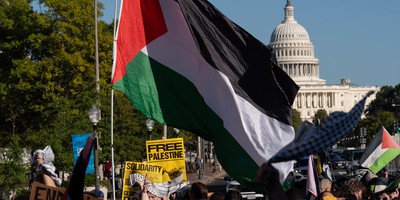I doubt Barzani intentionally echoed Woodrow Wilson's post-World War I call for political self-determination. Kurdish nationalists believe, with good cause, they were grievously wronged after World War I.
Kurd demands for independence have been repeatedly disappointed; despite Iraqi chaos, they may be disappointed once again.
The Kurds' landlocked wedge of planet earth is a geographic "tweener." Using the old names illustrates the Kurds' historic difficulty. To the south, Kurdistan meshes with Mesopotamia; to the east with Persia, to the west with the Levant and to the north with Greco-Roman-Byzantine-Turk Anatolia.
For three millennia Kurds have fought various imperialists -- Babylonians, Persians, Greeks, Romans, Byzantines, Arabs and Turks.
However, they thought their time had come in August 1920 when the victorious World War I allies ratified the Treaty of Sevres.
Sevres addressed the defeated Ottoman Turkish Empire's territories. It divided Ottomans' Arab provinces between France and Britain, gave Greece a slice of Thrace and handed Italy a chain of Aegean Islands. France and Britain took de facto control of the Bosphorus and Dardanelles (Turkish Straits).
Recommended
With an irresolute nod to Wilsonian self-determination, Sevres promised the Kurdish people a state or perhaps several autonomous states conveniently advised by allied political officials.
Though Sevres did not specify Kurdistan's precise location, Kurdish nationalists were ecstatic. Today, Kurds are the largest ethnic group in Southeastern Turkey, Northeastern Syria and a small triangle of Iran (Turkey-Iraq border area). Kurds are definitely the majority in the KRG. Kurdistan 1921 would have formed somewhere in this area, probably Southeastern Turkey ... maybe.
But Britain and France were not committed to seeing through an afterthought Kurdistan. The secular Turkish nationalist movement, led by Kemal Ataturk, insisted on Turkish nationalist self-determination. Turkish nationalists opposed the war-weary French and British occupiers and the rump Ottoman dynasty (dictatorship) the occupiers supported.
The Greco-Turkish War took Sevres' Kurdistan off the diplomatic table. Greek leaders sought to seize control of the eastern Aegean coast. Turkish nationalists defeated the Greeks. The Treaty of Lausanne (1923) settled the Greco-Turk fiasco, after a fashion, and made no mention of Kurdistan. Turkish nationalists would not cede another square-centimeter of territory.
Republican Turkey bitterly opposed an independent Kurdistan. Since 1923, Turkey has battled intermittent Kurdish insurgencies. The latest, which began in 1984, has Cold War connections. The Kurdistan Workers Party was a Marxist gang the USSR used to destabilize NATO's Turkey. The PKK, however, leveraged legitimate Kurd grievances and aspirations. Saddam Hussein's Iraq fought Kurd insurgents (hence the use of chemical weapons on the Kurds at Halabja). The Iranian and Syrian dictatorships confront Kurdish rebels.
Over the last decade, Turkish policy has evolved as the Turkish government sought a political solution to the Kurd insurgency in Southeastern Turkey. Turkey began investing in the KRG. KRG leaders encouraged the PKK to negotiate. Tit for tat? Probably. The KRG has tried to convince Turkey that it is a stable, moderate and reliable partner, politically and economically -- more so than Assad's Syria, ayatollah Iran or the chronically dysfunctional Shia-dominated Iraqi government of Nouri al-Maliki.
Iraqi Kurdistan has substantial crude oil reserves. This year, the KRG began selling crude without Baghdad's permission. The KRG ships its oil through Turkey.
If Iraq collapses, the KRG argues that, as Independent Kurdistan, it can provide Turkey with a stable buffer state also capable of stabilizing Kurdish Syria. Independent Kurdistan's peshmerga military forces, especially with Turkish support, can defeat the Islamic State militants.
In the wake of the ISIL invasion, the Turkish government said it supports Iraqi Kurdish self-determination -- self-determination, not independence. Turkish support for independence would have a high price: hands off Turkey's Kurdish region. The KRG, however, may not be able to make that guarantee. It has not been able to rein in PKK diehards. Iraqi Kurds may have to settle for a self-determined Kurdish autonomous zone notionally attached to Iraq, but supported by completely independent oil sales.

























Join the conversation as a VIP Member